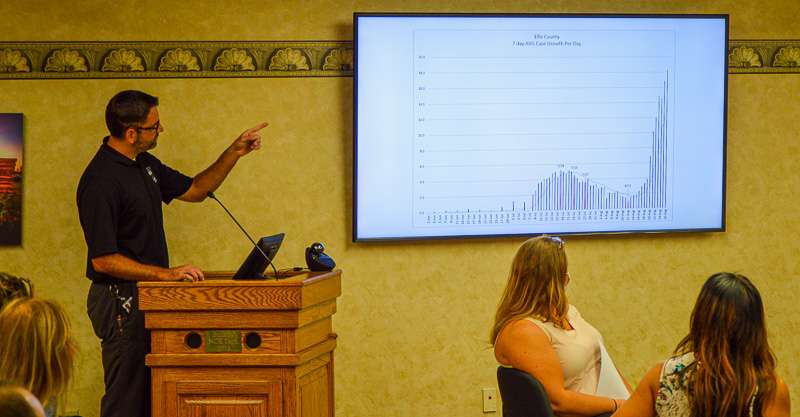
By JAMES BELL
Hays Post
There remains little good news with COVID-19 as cases continue trending up in Kansas, but Ellis County Health Services Director Jason Kennedy believes the situation is beginning to look better in Ellis County.
"Right now in Ellis County, we have seen improvement," Kennedy said. "We have seen improvement in both the percent of positives and in the number of cases."
Speaking Thursday, he said the percent of seven-day positives has fallen from a peak of over 25 percent to an average of around 15 percent.
"We have seen a significant decrease in cases per day and percent of positives," Kennedy said.
The percent of positives is a key indicator in community spread and tracks the amount of testing done, to the number of positives that come from that testing. That number rose to 21.5 percent in Friday's case update.
While that percent of positives is still higher than he would like, it is an encouraging trend.
Kennedy said he would like to see the percent of positives drop to under 10 percent and, ideally, the percent of positives would be under 5 percent.
Along with the percent of positives, dropping case totals are also a sign of progress in Ellis County, he said.
At a peak, there were 190 to 200 new cases per seven days, as of Thursday that was down to 99.
"The lower those numbers go, means the less amount of community transition we have," Kennedy said.
Keeping a declining trend going depends on individual actions.
"We have had community transmission for a long time. We would like to see improvements, but it really comes down to the public really paying attention to those basic health measures and really taking individual initiative to avoid those contacts that might lead to an increase in risk," Kennedy said.
While it is possible to be exposed to coronavirus in the community, the most frequent exposure comes from close contacts.
"A predominant amount of viral transmission occurs inside the home," Kennedy said.
While he said he understands that mitigation measures inside the home are not always possible, using those measures, especially with a positive case, can significantly reduce spread.
He said finding way to isolate groups together is also an important way to limit spread.
But that doesn't mean cutting off all contact.
"We need personal connections in life," Kennedy
Keeping groups small and static can help. Practicing those measures, he said, can help keep some normalcy in the community and limit the spread.
While it will not help limit COVID-19 transmission, Kennedy said getting a flu shot will help keep the community healthy.
"The flu shot this year is going to be extremely important just for a healthier community in general," Kennedy said.
He said the flu shot is an easy way to increase health by ensuring that an individual does not have a compromised immune response.
"If we make ourselves healthier, and that's not just the flu vaccine, that's healthier in general, if we eat healthily, exercise, get plenty of sleep, find time to unwind, unplug from the news media, unplug from Facebook, all of those types of things help to make you individually healthier. And the healthier we can make individuals in our population, the better their bodies can battle whatever virus it is, whether it is flu, cold or COVID."






